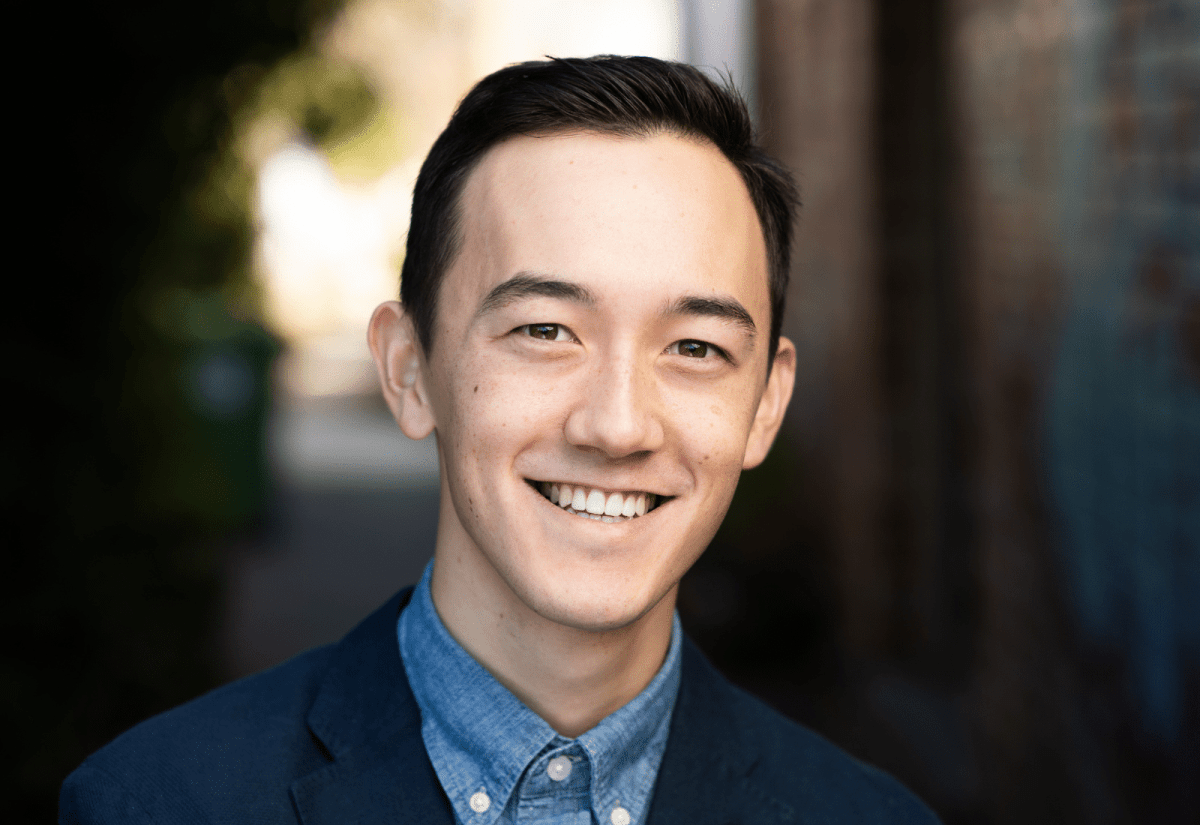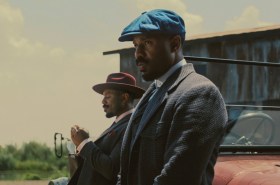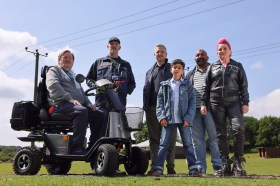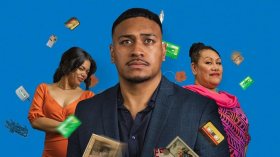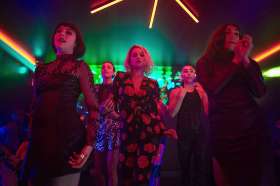Kim Ho is a non-binary, Chinese-Australian writer who is currently nominated for an AWGIE for their episode of The Newsreader‘s second season. In 2021 they were nominated for an AACTA for Best Screenplay in Television, and the following year they won (as part of the Newsreader creative team) the AWGIE for Best Television Series.
Kim’s success in television comes off the back of several years’ work in the theatre, writing plays that have been performed in Sydney, Melbourne, and even London. They’re currently working on an original series with SBS Television.
Read: The Newsreader Season 2 on ABC review: still a winner
Speaking to ScreenHub, they reflected on the nomination and their TV writing process, as well as looking at the industry at large and how things are shifting for non-binary creatives. They also tell us what they know about The Newsreader Season 3 …
Hi, Kim! How does it feel to be nominated for an AWGIE?
Kim Ho: It’s wild. I got nominated in Season 1, but that was co-writing with Michael Lucas. This is my first solo episode, and it’s such an honour to be recognised by peers.
You’re up against writers of Totally Completely Fine and The Great – have you seen those series? How do you reckon you’ll fare in the awards?
I’m up against Keir Wilkins for Totally Completely Fine, who I adore. I think it’s such a smart and moving series and one of those ones that takes you by surprise. And then of course, being up against Tony [McNamara] for The Great is wild! Especially when he’s currently competing in the international awards circuit with Poor Things. It just feels like ‘oh, okay, cool … well, I’ll do my best.’ He’s obviously such an industry mainstay, so it’s a delight to be nominated against him.
But yeah, I was a bit surprised that there were only three entries for that section of the AWGIEs. Still, it’s really nice to celebrating other people’s work. I think every time these awards come around, they start really great conversations around what awards actually mean for the arts. And they keep pushing us to make better stuff as well.
Can you explain your process for writing episodes of The Newsreader – do you use any particular techniques to create scenes, like a playlist?
I definitely create playlists. The ABC released an official one, and quite a few fans sent us playlists that they’d made in Season 1, too! I often key into those to get into the right mindset. It’s a great technique, and I also love listening to the all the bangers that have been included in the show’s soundtrack.
In terms of pacing an episode, that depends on which real-life news story we’re focusing on. For the episode about the Hoddle Street Massacre, we know that it occurred on a Sunday night, and had fallout throughout that Monday, Tuesday and Wednesday. The Monday morning scenes were crucial for the episode, to see the journalists working through the night with very little information and having their phones ring off the hook. And then Tuesday and Wednesday are the aftermath of that climax.
The technology of the time also plays a part in pacing an episode. Back then, people would write into newspapers, and it was very much slower than how quickly information spreads on the internet today.
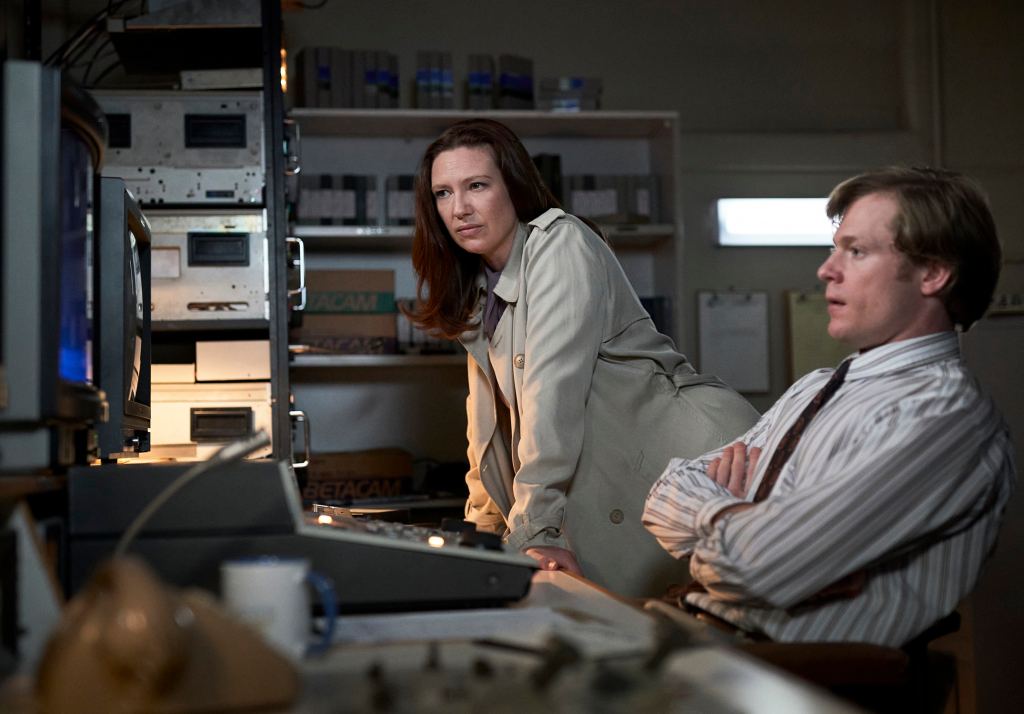
I grew up in the 90s and can remember snail mail and landline phones, so the methods of communication in Newsreader aren’t completely foreign – but I’m still surprised at just how slow it was!
Totally. I’m a child of the 90s as well, but I find it continually fascinating how hard we have to work eliminate story bits that wouldn’t have been possible at the time. For example, the characters can’t jump on a phone when they’re out and about, unless they find a payphone or borrow a restaurant’s landline or something. Just little things that.
And even certain phrases, like ‘first responders’, are too modern or too American to include. Someone will say ‘no, that’s an Americanism that entered Australian vernacular in the early 2000s. We can’t put that in.’ So it’s a lot of work to keep the vernacular to 1980s Australian, but I think we’ve done a decent job.
Here are some Americanisms Kim Ho had to filter out of their Newsreader scripts:
- ‘What’s the deal with…?’
- ‘Rob would flunk it’
- ‘Fix your screwup’
- ‘spewing’ (as opposed to ‘chucking [one’s] guts up’)
- ‘First responders’ (mostly a post-9/11 phrase?)
- ‘You’ve got this’
- ‘Dennis straight up asked me’ (as opposed to ‘flat out asked me’)
- And also … a mention of couscous! Michael [Lucas] wrote: ‘It would be hard for you as a child of the 90s to even comprehend how bland Australian food was in the 80s!! Popular use of couscous was still a way off.’
I imagine the ABC is pretty stoked at how The Newsreader showcases the archive footage they’ve collected over the years. How much research do you do in the archives when you’re writing?
I got my hands on as much as I could. It’s absolutely a part of my process. I really love to research the hell out of any topic I’m grappling with. But when you’re dealing with real life, and real people’s stories, I think the benchmark of responsibility is higher than getting the material.
I was looking at archive footage, as well as an amazing book that detailed a lot of testimony from survivors and the families of the victims and police, police records and a lot of newspaper clippings from that time as well. Then it was a matter of making sure we were sensitive enough to not get it wrong, and making sure it didn’t feel gross and exploitative, particularly with this episode.
We didn’t want to be doing the very thing that the journalists in this story were getting accused of – turning tragedy into entertainment.
Why was the story of the Hoddle Street Massacre the one you landed on for Episode 2 of Season 2?
Well, we choose the news stories before we even start writing, and we do that in the preliminary brainstorm. The choice is based on a couple of things, like which characters we’re wanting to explore that season. And we can’t jump too far through history, because the story’s got to make sense. But also it comes down to which stories stand out to us. It made a lot of sense to Michael to have this season build up to the 1988 Bicentennial, which meant that we were looking at 1987.
And we realised that the Hoddle Street and Queen Street massacres fell within that window. We deliberately didn’t choose to cover the Queen Street massacre, because I think it would have shifted the series into a very, very dark and grim place. But we felt that not covering either of them was almost irresponsible. The Hoddle Street massacre was such a massive event in Melbourne’s consciousness.
So much of the show is about the trust and faith we put in news reporters and news readers – particularly in that era, when there was a unique connection that newsreaders had with the public. And it felt like this was an example of where the public’s faith in those broadcasters was actually shaken.
I tend to feel quite stressed-out watching The Newsreader, because of the high-energy pacing and the seriousness of the subject matter. Do you experience a similar stress when you’re writing it, too?
I think that when you get into the writing of it, you start breaking it down into smaller parts to find your way through a scene, and it doesn’t get to you as much. I keep forgetting how stressful it is to watch the show! Hopefully, it’s a very pleasurable stress, similar to the way I feel watching episodes of Succession.
Sometimes when you’re too focused on the story beats you forget the emotional impact of the details that you’re assembling. So I think for me, it was about going back and forth between writer brain and audience brain. We don’t want to create drama that is so grim and depressing that people just want to turn it off, but it still needs to have a satisfying emotional arc.
Can you tell us about how the writing process is shared between different writers? How do you keep continuity of tone, for example?
Michael Lucas is really good at striking a balance between articulating clear goalposts based on his vision, and also giving us freedom to make the episodes our own. So the other writers on season two are Adrian Russell Wills, who wrote ep four, and Niki Aken, who wrote ep five.
We all have different sensibilities when we approach a story. Within the same world, each of us is trying to serve Michael’s vision as best we can, and bring different things to each of our episodes.
I was already working on my draft of episode two while the others were building the back half of the show. I also knew generally how things would end up by the end of the season. So I simultaneously knew where I was writing from, and what I was writing towards. That way we can set up certain plotlines or plant the seeds of things that are going to come up later.
You’re non-binary, I’m non-binary: how do you think the Australian screen industry is changing in terms of attitudes toward gender non-conformity?
That’s a really difficult question to answer. I’m already out to the industry. I feel really confident to identify publicly – it’s in my email signature, as you saw – and to most people it’s not a big deal. But there are some people who have a bit of anxiety around what the etiquette is, and I do get misgendered a lot.
My presentation is still quite masc[uline], mostly out of laziness, and people make assumptions based on that. I’m very slowly embracing a more femme presentation. But I am conscious that gender-queer and non-binary folks do not owe anyone androgyny.
Industry wise, there is still a preference for cis characters in scripts. I’ve only read one script I can think of where there is more than one non binary person. And those characters aren’t fully defined by their non-binary identity. Apart from that, I do think that it’s not understood enough. And maybe there’s this sense that we need to hit a certain threshold of gay and lesbian representation before we say ‘OK, let’s do this non-binary thing’.
Yeah, it’s like: ‘we’re only just accepting homosexuality, we’ll get to gender queerness later …’!
Exactly. And I’m adverse to confrontation, so I often won’t pull people up on misgendering me the first time. It’s also really difficult to agitate when you’re the only non binary person in the room agitating.
Similarly, as a person of colour, I’ve seen a lot of well meaning people say all the right things, but never follow through. And that includes valuing diversity on screen, but not off, and mostly it’s superficial gestures towards inclusivity but not doing the deep work of researching lived experience. But I’m really excited to be proved wrong!
Have you got any projects lined up for 2024? What about The Newsreader season 3?
I’m working on a few shows and a few plays right now, and a TV show that I can’t talk about, unfortunately. Season three of Newsreader is currently shooting, but I was only able to attend early brainstorming rooms for this one, so I’m not working on the season proper.
From what I’ve heard, it’s gonna be really cool. I think it’s the show is embracing its thorny side, and it’s going to get messy.
I also worked on NCIS Sydney last year, which I think is still premiering in the States, which has been absolutely wild. It’s such a strange but wonderful thing to exist. And a really interesting blend of American and Australian production practices.
When the CBS decided to bump NCIS Sydney up from our planned time slot and into primetime, that made it the first Australian show ever to air on US primetime. And it premiered to something like 5.1 million people. For reference, The Newsreader season one was ABC’s highest rated drama for 2021 – and that reached around 1.3 million people. It’s just so wild … I guess that’s what having a big commercial show in a country with ten-times as many people can do!
The Newsreader season 2 is currently streaming on ABC iview.
